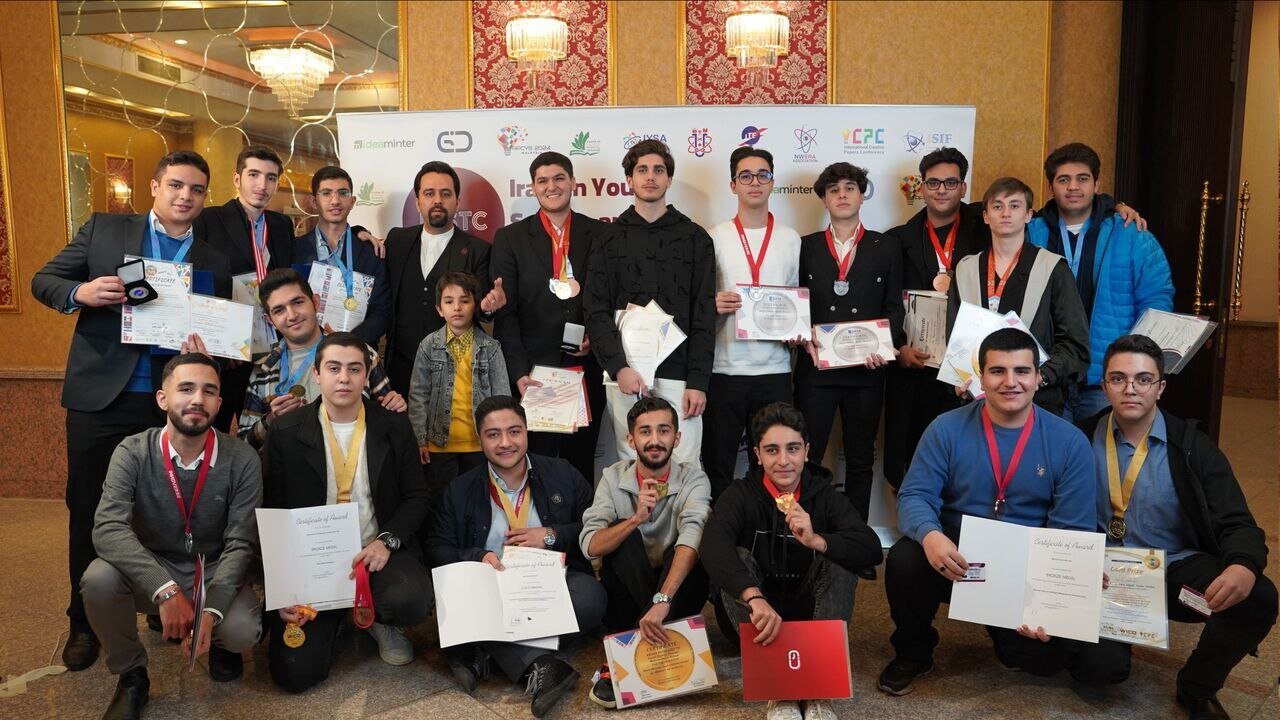Iran shines at INNOVERSE 2025

TEHRAN – Iranian students have managed to grab 13 medals - three gold medals, four silver medals, and six bronze medals - at the INNOVERSE International Invention & Innovation Expo, showcasing their exceptional talents in science and technology.
Hosted by the United States, the event was held online on August 24. INNOVERSE 2025 represented more than a competition; it was an arena for collaboration, knowledge exchange, and intellectual growth across disciplines and generations.
It provided a distinguished platform for inventors, researchers, students, and emerging talents from around the world to introduce their ideas, inventions, and scientific contributions.
The projects encompassed fields such as advanced technologies, artificial intelligence, social development, and environmental sustainability, Innoverse.world reported.
This year, a total of 177 teams from 47 countries, including Armenia, Bangladesh, Belgium, China, France, Chile, Iran, Iraq, Saudi Arabia, Japan, Taiwan, the UK, the U.S., Vietnam, India, and Finland, participated in the competition.
Ilia Majidzadeh Heravi, Parsa Karimi Yazdi for inventing ‘CommuniMateSmartApp: Solutions for Deaf Communication Challenges’, Artin Radmatin, Ava Alebouyeh, Baran Bahman, Elyar Ferdosizadeh, MohammadHossein Ezzati, for ‘Evaluation of the effect of using magnetic gear in improving the performance of process systems based on mechanical gear’, and Niki Abtahi, Parsa Ahmadpour Rahiminejad, Baran Derakhshandeh Daryasari, Sarina Nosrati, Ramiya Rahjou, for their invention ‘Improving the design of pneumatic muscles: Simulation and analysis of the dynamic behavior of the system’, bagged home gold medals.
Mehran Rajabi and Alireza Jafarnezhad, for the invention of ‘EcoNet Bin: An AI-IoT Powered Smart Waste Segregation System for Efficient Recycling’, Yasin Abbasi, Ali Rahbari, Nikasadat Hosseini, Kiarash Rshidzadeh Gargari, and Eizadyar Jalali Pour, for the invention of ‘Medismart Smart Pharmacy Solution’, Parmida Salahmand and Sorena Salahmand, for their invention titled ‘Development of Nano-Composites Containing Herbal Extracts with Resistance to Wear and Oral Bacterial Decay’, and Matin Hayati, for inventing ‘Automated Analysis and Visualization of EEG Signals for Seizure Prediction Using Frequency Band Decomposition’ successfully clinched silver medals.
Mohammad-Sam Nemati-moein, and Mahan Ghadimi, for ‘Evaluation of Gamma-Aminobutyric Acid efficiency on Caco2 Colorectal Cancer Cells’, Rojina Hoodehshenas and Baran Moradi, for ‘Preparation and characterization of an antimicrobial biodegradable biofilm packaging based on Silver-zinc oxide nanocomposite with sago starch and ziziphora essential oil for protein based Packaging application’, Sam Rashidi and Radin Abasi, for ‘Design and Implementation of Smart NannyBot: A Humanoid IoT-Based Robot for Remote Child Activity’, Arshia Chehrezad, Taha Tajik, for ‘Fabrication of a Hydrogel Containing Captopril and Investigation of Its Effects on Oral Ulcers in Type 2 Diabetic rats’, Raman Nafarieh, for ‘Evaluation of a novel herbal nanogel formulation on skin cancer cells utilizing the MTT assay’, as well as Moeid Rajabi and Helena Rajabi, for ‘Protecting Curious Little Minds: A Smart Child Safety Solution with IoT and Image Processing’ secured bronze medals.
Recent achievements
The Iranian students have grabbed five gold medals at the 18th International Olympiad on Astronomy and Astrophysics (IOAA), marking the country’s second consecutive world championship.
The event was held from August 11 to 21, in Mumbai, India, attracting over 300 high school students from 64 countries. During the event, students participated in several challenging exams covering theoretical, observational, and data analysis aspects of astronomy.
The five-member Iranian team comprised Ali Naderi Lordjani, Arshia Mirshamsi Kakhaki, Hossein Soltani, Hossein Masoumi, and Hirbod Foodazi. The first three students are placed atop the whole winners.
This remarkable achievement is the result of the students’ dedication, the support of their families, the tireless efforts of their coaches, and the solidarity of the country’s scientific community, which has once again raised Iran’s flag in the international arena, Pres TV quoted a statement by the Ministry of Education on August 23.
Iranian students continued to showcase their excellence at international competitions by winning medals at the Yakutia International Science Fair (YISF) and the World Invention Creativity Olympics (WICO).
YISF was held in Yakutsk, Russia, from July 6 to 9. The event brought together 129 teams from 10 countries, participating in two different categories.
The first category included mathematics, computer science, and information technology, and the second one involved physics, astronomy, and engineering.
In the second category, Mehran Rajabi and Alireza Jafarnejad ranked first for their project titled ‘EcoNet Bin: AI-Driven Waste Segregation with IoT-Enabled’.
‘Protecting Curious Little Minds: A Smart Child Safety Solution with IoT and Image Processing’ was the name of the project presented by Moeid Rajabi and Helena Rajabi, who secured second place.
Artin Radmatin, Baran Bahman, Mohammad-Hossein Ezzati, Niki Abtahi, Sarina Nosrati, and Baran Derakhshandeh won third place for ‘Evaluation of the effect of using magnetic gear in improving the performance of process systems based on mechanical gear’.
Also, Zhina Aminorroaya-Karladani managed to grab the special prize for her project, ‘UVGuard Grooming Brush’.
In the first category, Artin Salari and Amir-Abbas Kavosi Amin ranked second for ‘Smart Glasses for the Blind with Real-Time Object Detection.
Ilia Majidzadeh Heravi and Parsa Karimi Yazdi came in third for their project titled ‘CommuniMate SmartApp: An Innovative Solution for Deaf Communication’.
WICO is a global platform for inventors to showcase their talents, explore new ideas, and gain recognition.
The 14th WICO was held from July 17 to 19 at Seoul National University of Education in South Korea. Hosted by the Korea University Invention Association (KUIA), the 2025 edition gathered 313 teams from 28 countries, creating a global platform to share advancements in science, technology, and invention.
Radin Abbasi and Sam Rashidi claimed the gold medal for building a humanoid robot called NannyBot to manage children’s activities using the Internet of Things.
Matin Hayati’s project, ‘automatic analysis and display of EEG signals for seizure prediction using frequency band analysis’, and Raman Nafarieh’s project titled ‘studying the effect of plant nanogels on skin cancer cells’ grabbed the silver medals.
MT/MG
Leave a Comment